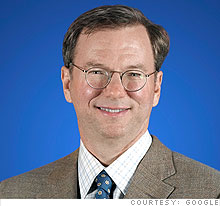 Just how long has Eric Schmidt, the chief executive of Google, been thinking about creating a rival to decades-long rule of the PC world by Microsoft?
Just how long has Eric Schmidt, the chief executive of Google, been thinking about creating a rival to decades-long rule of the PC world by Microsoft?
The ideas behind the Chrome OS go back many years, even as far back as 1995, when Schmidt was the chief technology officer of Sun Microsystems. He was interviewed by George Gilder, who wrote about the implications of the Internet on the personal computer in an article dubbed “The Bandwidth Tidal Wave.” Gilder later included it in his book, Telecosm.
In the article, Schmidt, who has a doctorate in electrical engineering and computer science, predicted that the duopoly of Microsoft and Intel (Microsoft’s operating system Windows has typically run on microprocessors built by Intel) — would be “hollowed out” by the Internet. That is, plentiful broadband connectivity would mean that you wouldn’t really need a client-heavy operating system and the heavy-duty chips to run it. You could get by with a thin client. That client would connect to servers in an Internet-connected data center, where the heavy computing would take place.
Schmidt’s boss, Scott McNealy, and Oracle chief executive Larry Ellision touted the Network Computer as the solution, a thin client that was connected via high-speed networks to blazing fast servers.
June 5th: The AI Audit in NYC
Join us next week in NYC to engage with top executive leaders, delving into strategies for auditing AI models to ensure fairness, optimal performance, and ethical compliance across diverse organizations. Secure your attendance for this exclusive invite-only event.
Back then, it was wishful thinking. The vehicle was the web and Sun’s Java translation software. But Java had a lot of problems — it was slow and ran into many incompatibilities across hardware types — and so never lived up to its promise. The dotcom crash destroyed what was left of the fantasy, as Internet businesses fell out of favor for several years.
Broadband has arrived, but not the kind of blazing-fast broadband that would have made it much easier to hollow out the PC. Rather, applications grew more demanding and that meant they had to be executed by hardware on the PC, not in the server cloud.
But today, Google is launching an operating system called Chrome OS that could make cloud-based computing a reality. Cloud computing has its advocates everywhere. But Schmidt has been methodical about getting ready for this war with Microsoft.
Schmidt left Sun for Novell and then became CEO of Google in 2001. As Google became hugely profitable in search, it became clear it would have the profits to take on Microsoft in many categories. Rumors surfaced that the company was working on a Google PC. In fact, in early 2006, the media was almost certain that Google co-founder Larry Page would talk about the Google Cube computer at the Consumer Electronics Show.
It didn’t happen, and the rumors started to die. But Google kept doing things that made it seem like it was on the path to making its own operating system. It created web-based productivity applications such as Gmail, Google Docs and other rivals to Microsoft’s Office suite.
It created Gears, which let web applications run in a browser even when the computer wasn’t connected to the Internet. Nine months ago, Google launched Chrome, its own open-source web browser aimed at making web applications run much faster. It all seemed like Schmidt’s agenda was to create a Microsoft-free world, one domino at a time.
[photo: sodemac]
